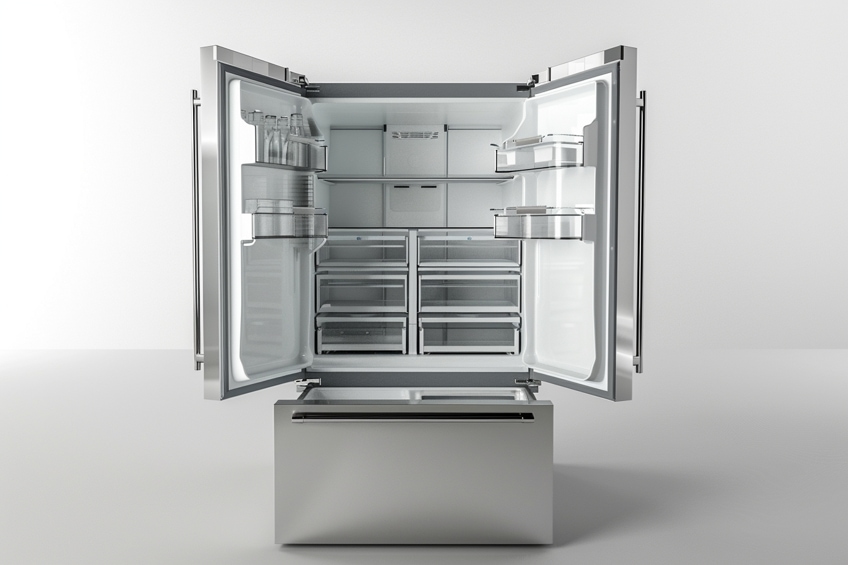How Much Does a Refrigerator Weigh? – The Gravity of Cooling
This post may contain affiliate links. We may earn a small commission from purchases made through them, at no additional cost to you.
Ever tried lifting a refrigerator with your bare hands? Trust me, it’s not your average workout! Whether you’re pondering a kitchen remodel, moving homes, or just curious about the sheer heft of these chilly appliances, the question remains: How much does a refrigerator actually weigh? Join me on a cool exploration into the weighty world of fridges, where we’ll uncover the cold, hard facts behind these behemoths of the kitchen!
Key Takeaways
- The weight of refrigerators varies widely, from around 60 pounds for a mini fridge to over 400 pounds for larger models.
- French Door refrigerators are typically heavier due to their size and features.
- The weight is a crucial factor to consider for logistical reasons such as installation, moving, and floor support.
Average Weight of a Refrigerator
Refrigerators are essential appliances in modern households, playing a critical role in food storage and preservation. The question of how much a refrigerator weighs is not trivial, as the weight impacts various practical aspects such as delivery, installation, and moving. Typically, the weight of a refrigerator depends on its type, size, and features. For instance, french door models are heavier on average compared to top freezer refrigerators. Understanding a refrigerator’s weight is beneficial for homeowners planning to remodel their kitchen or when preparing for a move. On average, standard refrigerators weigh around 250 pounds, but this can vary significantly.
Compact mini-fridges might weigh as little as 60 pounds, whereas luxurious French door models can go up to 400 pounds or more. The presence of additional components like an ice dispenser can also add to the appliance’s weight.
The weight of a refrigerator can vary widely depending on its type, size, and features. On average, full-size residential refrigerators typically weigh between 100 and 400 pounds (45 to 181 kg). Specific types, however, have their own average weights. Below is a structured breakdown:
- French door refrigerators are generally on the heavier side, with an average weight of around 317 pounds (144 kg).
- Side-by-side refrigerators come in at an average of 285 pounds (129 kg).
- Top freezer refrigerators, often more compact, average 166 pounds (75 kg).
- Bottom freezer refrigerators strike a middle ground with an average weight of 214 pounds (97 kg).
- Mini fridges, the lightest of the lot, maintain an average weight of around 60 pounds (27 kg).

It’s essential to consider that the presence of additional features such as an ice dispenser can affect the overall weight. Moreover, refrigerator weight is also contingent on the unit’s capacity, where larger models, particularly those with French doors, can tip the scales at over 300 pounds (136 kg). The capacity and weight correlation is especially noted in ranges spanning from 18 to 32 cubic feet, where weights can ascend to 450 pounds (204 kg) for the heftiest models.
Understanding Refrigerator Weight
The weight of a refrigerator can vary widely based on its model and design, significantly impacting handling and placement. Sizes range from compact mini fridges to large French door models, with corresponding weights that reflect their capacity and features.

By Model
Refrigerator weights vary widely depending on the model and size, typically ranging from 200 to 400 pounds. Always check the specifications of your specific model for accurate weight information. Considering the design, a French door refrigerator, for example, with its spacious compartments and multiple doors, weighs more than simpler top freezer models.
- Mini fridge: Typically, a mini fridge weighs around 60 pounds. These are compact and designed for convenience.
- Top freezer refrigerator: On average, these weigh approximately 166 pounds.
- Bottom freezer refrigerator: They tend to weigh around 214 pounds.
- Side-by-Side refrigerators: These models average a weight of 285 pounds.
- French door refrigerators: The weights can range broadly from 300 to 450 pounds.
Factors Influencing Weight
The weight of a refrigerator is influenced by several factors. Firstly, the materials used in its construction, including metals, plastics, and glass, contribute to its overall weight. Moreover, the type and amount of insulation, crucial for efficiency, also impact the fridge’s mass. Additional features such as ice makers or water dispensers can further increase its weight. Additionally, refrigerators generally weigh around 12 pounds per cubic foot of capacity.

Therefore, a larger capacity necessitates more materials, resulting in a heavier appliance overall. The weight is also a reflection of the refrigerator’s robustness and the quality of materials used in its construction. For instance, a model designed with a stainless steel exterior might be heavier than one with a plastic finish. The design of the refrigerator, including the number of doors and drawers, also plays a significant role in its final weight.
Calculating The Weight Of A Refrigerator Based On The Type
Different types of refrigerators have distinct weights, mainly influenced by their size, design, and additional features such as ice makers. The following subsections categorize the common types of refrigerators and provide specific weights for each category.
Mini Refrigerators
Mini refrigerators typically weigh 60 pounds. They are compact units designed for personal use or to fit in small spaces, and their weight reflects their reduced capacity and features.

Two-Door Top Freezer Refrigerators
On average, two-door top freezer refrigerators tip the scales at about 166 pounds. These models have a separate freezer compartment located above the refrigerator section.
Two-Door Bottom Freezer Refrigerators
The bottom freezer models are slightly heavier, averaging around 214 pounds. This design places the freezer at the bottom for easier access to refrigerator items at eye level.

Side-by-Side Refrigerators
Side-by-side refrigerators are designed with the freezer and refrigerator compartments adjacent to each other and typically weigh 285 pounds. Their larger width and inclusion of in-door ice dispensers contribute to the extra weight.
French-Door Refrigerators
French-door refrigerators combine a bottom freezer with a two-door upper section and have an average weight of 317 pounds. Larger capacity models within this category can weigh anywhere from 300 to 450 pounds, influenced by additional features and the unit’s total cubic feet.

Practical Aspects of Refrigerator Weight
When individuals look to buy a new refrigerator, considering the weight of the appliance is crucial for several practical reasons. Weight affects the move and installation process, the required maintenance, and the materials required for the refrigeration unit’s design and longevity. Refrigerator size and capacity are significant factors that directly influence weight. Standard refrigerators typically range from 200 to 400 pounds, with larger models, like French door refrigerators, weighing more due to increased capacity and materials. When moving a refrigerator, its weight will dictate the method and manpower needed. Heavier units may require professional movers or special equipment to safely navigate through homes without causing damage.
During the appliance selection process, it’s vital to compare different models not only for their features but also for their weight, especially if the refrigerator needs to be moved frequently or the floor can only support a certain amount of weight.
Materials used in manufacturing refrigerators such as steel, plastic, and insulation also contribute to the overall weight. Consumers must consider these factors to ensure they choose a refrigerator that matches their space constraints and physical capacity to move it when necessary. In terms of design, larger refrigerators with more features, like in-door ice systems, can add to the weight. Knowing this helps in assessing whether the maintenance requirements and the durability of the flooring in one’s home can accommodate the chosen model.
The Importance of a Refrigerator’s Weight
Understanding the weight of a refrigerator is crucial for several practical reasons. Firstly, installation logistics are significantly influenced by the appliance’s weight. Heavier models may require additional personnel or specialized equipment to move and position them safely. It’s important to consider the weight during transportation and installation to prevent physical strain or damage to the premises. In terms of floor support, the refrigerator’s weight is also a determining factor. Certain flooring materials or construction may have weight limitations.
A heavy refrigerator may need a reinforced area to ensure long-term stability and avoid potential flooring damage.

Moreover, the weight of a refrigerator affects its portability and adaptability. If homeowners or tenants opt to remodel or rearrange their kitchen space, moving a lighter refrigerator might be easier and more feasible. They must be cautious of heavier models which may require additional planning and effort to relocate. Consumers should consider these factors when choosing a refrigerator to ensure it aligns with their spatial constraints and lifestyle needs. Manufacturers often provide weight specifications to aid buyers in making an informed decision that accommodates the structural capabilities of their living space.
As we wrap up, it’s clear refrigerators come in all shapes and sizes, with weights that can truly surprise! Whether you’re renovating or just curious, remember: next time you see a fridge, appreciate the weight it carries in our kitchens. Stay cool, stay curious, and maybe leave the heavy lifting to the pros!
Frequently Asked Questions
Can You Specify the Weight of an Average Single-Door Fridge?
An average single-door refrigerator typically weighs approximately 150 pounds. This weight can vary slightly depending on the exact size and features of the model.
How Does the Weight of a Double-Door Fridge Compare to Other Models?
Double-door refrigerators, also known as French Door models, generally weigh between 250 and 350 pounds. They are heavier than single-door models due to their larger capacity and additional features.







